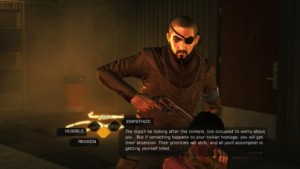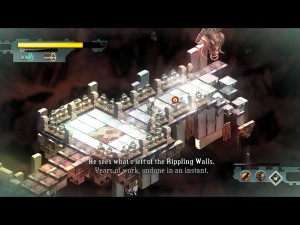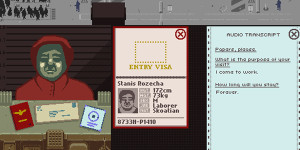In our conclusion to discussing dialog in video games, we dive deeper into actual game examples of dialog. In particular, I want to look at what makes good use of dialog in games much more than what doesn’t, though I have devised a little test to figure out how the dialog fits (though it is always going to be subjective). After all, games can be different, but it is a shame to believe something is great when it isn’t. Also, to be clear, the images presented are for First class citizens and just spread throughout the post.
The social order of dialog
Third class citizens
These are some of the worst offenders for how to handle dialog. In general, though, games do not wholly sit in this category. For this category, dialog can be confused with loading screens. The game is worse with its addition and better with its removal. This might sound a bit harsh, but poorly handled (which can include the writing quality) dialog can become the thorn in someone’s memory that overshadows the good in the game. Don’t give gamers a reason to hate your game.

I feel a lot of JRPGs fall into this category at times. Bravely Default did by the end. Legend of Legaia (one of my favorites) wasn’t immune to it either. Generally JRPGs seem to keep much closer tabs on the dialog immediately for the story but can go off the deep end for everything else (and arguably some of the emotional scenes, but that might just be translation issues). Repeated lines (such as characters talking at the end of a battle or a game you might play a dozen times) also does nothing but slow the game down and make the dialog unpleasant.
Child of Light completely falls into this category. The dialog got in the way of the rest of the game, was not enjoyable to read, didn’t give much context that wasn’t generally apparent just from the surroundings, didn’t make objectives clear (which was then made clear elsewhere), and did not make the characters more relatable (arguably making them feel more like puppets). I feel the game might have been more interesting if this was a mute world (could be a unique experience with more miming which shows off the visual artists’ abilities) possibly with a journal written in prose for people who wanted more context (or it could rhyme if it must). Keeping a journal separate also removes the interaction from the primary gameplay and allows those who don’t care to just carry on. But even just cutting the dialog so quests and events just happened I feel would have been more enjoyable.
Second class citizens
Here, I feel dialog can be considered better than set pieces, but it’s still more of a type of background or support than actually a part of the game. In similar terms to above, the feels worse than the actual game (game is worse with it) but it is also needed (game is worse without). This is an unfortunate position for a game to be in because the easy solution of just cutting it doesn’t work. I do think that it is very common though.
Adventure games have an issue with this. That isn’t to say that some of the dialog can’t be very good and enjoyable. It’s just that dialog menus (especially ones for interrogating a character to fill in all of the background) really don’t feel fun. Again, maybe some humor is nice or having the story unfold as part of the dialog can be effective, but the biggest problems lie in swaths of background or context that are just boring. You could claim this is extra like a journal, but it isn’t clearly labeled as extra. Instead, you have to wade through everything to ensure you know enough for your future objectives and puzzles or risk having to backtrack to everyone you can talk to looking for what happens next. And some games had you seem to ask the same thing multiple times or just talk to someone multiple times to trigger things. That is a poor experience (The Cave had that as the trigger for the good endings which honestly didn’t make a lot of sense nor was it ever even implied in the game). I’ll accept it for Easter eggs like the knife game in Full Throttle though.

Action games also tend to have problems with dialog. This isn’t surprising to me since the game is all about action and the challenges that come from that. I don’t think it has to be that way, but a lot of games use dialog to just dump story and context on the characters (Gears of War believes this is how the story should be told, for instance). Others do a better job, but have problems with it taking too long and just pulling the player away from the game. Metro 2033 has some of this, but I can’t fault it for trying to create a full experience. I can fault it for making players wait so long to play a game.
Half Life 2 would have to fall into this category today though I don’t think it would have when it released (especially with my first play through). Looking back on it, there are just long sections where the player is confined and dialog happens. I have no issue with the fact that the dialog doesn’t actually involve you talking (I do think they play that well into the story as somewhat of a joke). I do have an issue with waiting so long to get back to the rest of the game though. The reason I don’t think this would have been so bad a decade ago comes down to how many new experiences still could be seen at this point. The models lip syncing and gesturing in a somewhat human way was impressive. There tended to be object you could play with around the room in a very unstructured way (like the mini-teleporter and hula doll in the lab). I would have probably just called it gimmicky to an extent, but they do try to use the dialog for both narrative and pacing (where these are supposed to be the low intensity times). Since this is a game where you are never not playing as your character, pacing has to come in character as well. It’s all a good idea, but playing through again, I can’t help but be very bored waiting for the plot to start going again.
First class citizens
These are the games where dialog is really a part of the game. Stated like above, the game is better with it and worse without in a significant way. I say significant way because this is going beyond context is missing; the idea is there is a part of the game or the experience that is gone.
This can come in many forms. Good narration for the story I feel is an intensely good use of dialog. The narrators in Gone Home and The Stanley Parable are the entire driving force for the story and make them into enjoyable experiences. The games are arguably walking simulators (taken from a Steam community tag) that have excellent narration. Supergiant Games succeeds with this in their action games as well (as of time of writing, I have only played Bastion, but I have read that Transistor is similar). Bastion would have been a rather boring game if there was no story or just places where text was thrown at the user to give context. Instead, the story seems to open up as you open up the world in a very natural way and make the games something much more.
Then we have games where the dialog is an interactive part of the game which itself becomes a puzzle. I feel Deus Ex Human Revolution was amazing for this. Not only do you have to consider your responses (which they do a great job of explaining the reasoning you can take for that response which gives a good idea what your character is going to say), but the character you’re talking will respond appropriately. The dialog also seems to not have a single path to the right answer; if you pay attention, you can decipher what should happen and resolve a conflict in a diplomatic way (which really fits with your character) while giving a different set of gameplay challenges. But in the end, it is optional. Failing the dialog challenge does not prevent you from advancing in the game though it might make a future section more difficult (or cause you to have an immediate threat because you did not convince someone to surrender). All of this works together to add a fun minigame that feels appropriate and helps to characterize both your character and others in the world.

Papers, Please resides in the middle in an amazing way. At times, what people say to your character is part of the puzzle to actually doing your job. At other times, it provides all the context for what you are doing. And sometimes it is humorous or depressing. In the end, Papers, Please is somewhat of a puzzle game that has context heaped on top. And that context makes the experience. If the people you interacted with just provided the context for your job, they would be nothing more than another document for you to check over. As it is, though, they can actually be human with human problems. It’s a game where I consciously would make a mistake because I wanted to help someone whose story I had heard in just a few sentences.
There are a couple of games that I think are honorable mentions to this category, but couldn’t make it for other damning reasons. Arguably, Half Life 2 should be in this list, but I feel that its dialog is still just an elaborate text wall of story and context that occasionally pops up which precludes it from being here.
The Alpha Protocol and LA Noire should be in this list, but they share one very bad problem: lack of context to your actions. I’m not saying they don’t have other problems, but for their dialog, they just don’t give enough context. I feel the Zero Punctuation reviews of both bring it up well (in Yahzee’s over the top, super fast, and mildly offensive way) found here (Alpha Protocol) and here (LA Noire). What I mean by this is that the dialog sections are their own puzzles, but you are only given one word to describe what your character will do or say. These single words frequently do not give enough context to know what your character will actually bring up or do which means that sometimes you make mistakes because you didn’t think that’s what it meant. Playing the game of what the developers meant is not a fun game when dialog should be extremely immersive. These were large parts of what made me just stop playing the games (with the fact that you play as a sociopath with no other characterization being the other big problem for Alpha Protocol and the useless sandbox/action elements being a big problem in LA Noire).
This might be a bit surprising, but I feel Metal Gear Solid tried to do dialog well (and I think its sequels got worse except maybe for 3; the predecessors were “better” but some of that is just because it was less but I also never found NES era dialog to really be engaging for some reason). They do have you needing to talk to people as part of the story in ways that does make sense. They then moved extra information into the many optional conversations you could have by calling people when it wasn’t required. They also opted for stopping time so you don’t ever feel rushed in a conversation which helps them to just play out at a more enjoyable pace. A couple not realistic but excellent game choices they have are the fact that people will talk about the controller and buttons to press without hesitation and people already knowing the context. In a game, a player knows they are playing a game and they know what just happened. Pretending otherwise for realism frequently is awkward and takes extra unneeded time for “realism” that isn’t needed (games are not real; maybe in a simulator game you could justify that). I can’t put the game here though (even though I love it) mainly for how dumb the characters can sometimes be and just how much required dialog you have to sit through. The script is quite long and can get in the way of playing the game.
Conclusion
Dialog is an important and essential part of many games. It really needs to be part of the game though. Dialog is not just some garnish for the meal that is the game itself; it should be the seasoning that pulls it together at a minimum and can be so much more with more thought. Consider just how much characterization and humanity comes for people talking compared to insisting that a game needs nothing but action and occasional justification.
Amazing games can be made with well handled dialog. Good games can become much worse with mishandled dialog. In the end, dialog should have the same respect as any other component, and gamers will be happy for it.